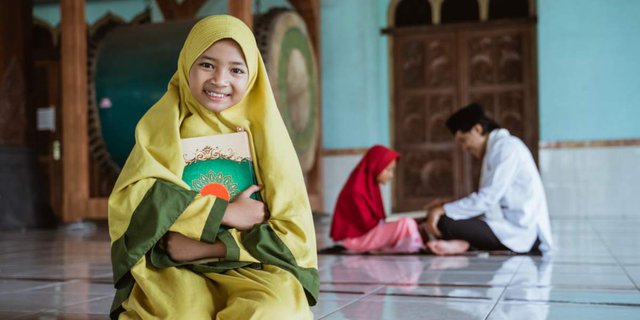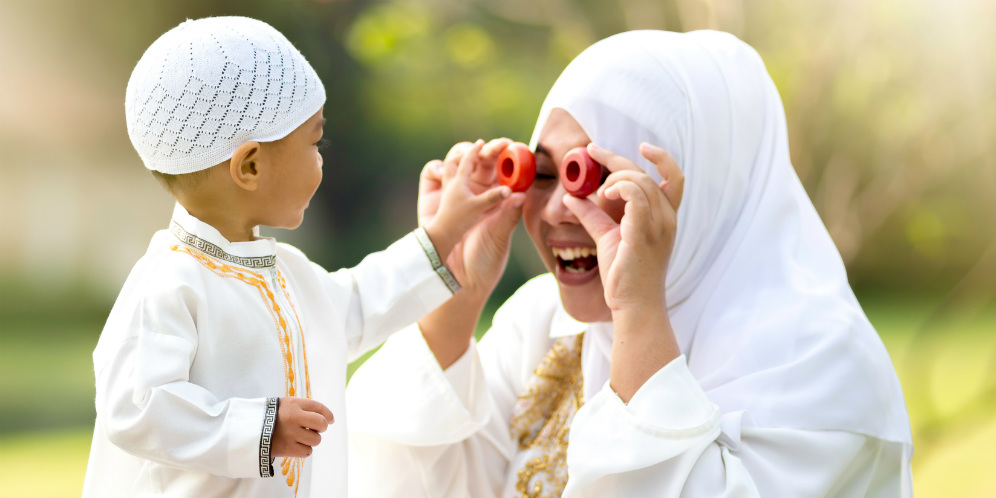Beautiful Design of Subsidized Houses Type 30/60, Combination of Colors Spoil the Eyes
The owner adds a touch of yellow color to the interior to create a bright impression.

Dream - Seeking religious knowledge is mandatory for every Muslim. Therefore, since childhood, children should be accustomed to reciting the Quran and attending assemblies of knowledge or studies.
They can learn Iqra, memorize surahs, or listen to the exemplary stories of the Prophets and their companions. When parents attend studies, whether in person or online, involve the children and let them listen if the study topic is suitable for children.
The blessing of knowledge, God willing, will be obtained by children for their future provision. Quoted from Muslim.or.id, the wisdom of children attending assemblies of knowledge is like the story of the companion of the Prophet Nu'man bin Basyir (may Allah be pleased with him).
He was a companion of the Prophet (peace be upon him) who was only 8 years old when the Prophet passed away. Nu'man was the first baby born to the Anshar tribe after the Prophet's migration to the city of Madinah.
It is extraordinary that at the age of 8, Nu'man had memorized and narrated many hadiths from the Prophet (peace be upon him). He narrated about 114 hadiths.
Meaning, the hadiths he memorized and narrated were the ones he obtained from the Prophet (peace be upon him) from before the age of 8 until the age of 8.
Furthermore, one of the hadiths he narrated is considered by scholars as one of the 3 core hadiths of Islam, namely:
First, the hadith of Umar bin Khattab:

Meaning: "Actions are judged by intentions."
This hadith serves as a benchmark for inner actions.
Second, the hadith of Aisha:

Meaning: "Whoever performs an act of worship that has no basis in our religion, it will be rejected."
This hadith serves as a benchmark for outward actions.
Third, the hadith of Nu'man bin Basyir:

Meaning: "Verily, what is lawful is clear, and what is unlawful is also clear..."
This hadith serves as a benchmark for what is lawful and unlawful. The life of the young companion, Nu'man bin Basyir, provides lessons for us as parents and organizers of studies.
Do not underestimate the presence of young children in assemblies of knowledge. It is possible that they capture one benefit of knowledge that will be useful for many Muslims in the future. Read more here.
Dream - Taking care of a child's mental health is just as important as their physical health. Unfortunately, many parents do not pay much attention to the psychological development of their children.
Their focus is more on meeting nutritional, material, and academic needs. In this regard, Islam provides guidance for parents to take care of their children's health.
What are they? Quoted from SanadMedia, here is the explanation.

Choose a Good Life Partner
Islam's concern and attention to a child's psychological health begin long before they are born. Islam encourages men to choose a pious mother for their children (their prospective wives). Likewise, women are encouraged to choose a righteous father for their children (their prospective husbands). In this regard, the Prophet Muhammad (peace be upon him) said:

Meaning: "A woman is married for four reasons: her wealth, her status, her beauty, and her religion. So, choose the religious one, and you will be successful." (Narrated by Al-Bukhari)
The Prophet also said:

"If someone comes to you proposing, and you are pleased with their religion and character, then marry them. If not, there will be mischief on earth and widespread corruption." (Narrated by At-Tirmidhi)
Do Not Show Favoritism
Some parents treat their children differently (show favoritism). This will have a very negative impact on the child's psychological condition, even into adulthood.
Therefore, Islam commands parents to treat their children fairly in terms of giving and interactions, reflecting love and affection. It is narrated from Al-Hasan, he said:

Meaning: "Once, the Prophet (peace be upon him) was having a conversation with his companions. Suddenly, a little boy came to his father who was among the people. The father then stroked his head and sat him on his right thigh.
Not long after, his daughter came to him and approached him. He stroked her head and made her sit on the ground.
Then the Prophet said, 'Can you sit her on your other thigh (left)?'
So, the man sat her on his other thigh. Then the Prophet said, 'Now you have done justice.'" (Narrated by Ibn Abi Ad-Dunya in An-Nafaqah 'ala Al-'Iyal)
For more details, read here.
The Quran criticizes the people of ignorance when a baby girl is born, they welcome her with sadness and pessimism. Such attitudes towards the birth of a girl are forbidden. Allah SWT says:

Meaning: "And when one of them is informed of [the birth of] a female, his face becomes dark, and he suppresses grief. He hides from the people because of the ill of which he has been informed. Should he keep it in humiliation or bury it in the ground? Unquestionably, evil is what they decide." (Quran 16:58-59)
Some parents treat their children differently (favoritism). This will certainly have a negative impact on the psychological condition of children, even until adulthood.
Therefore, Islam commands parents to be fair to their children in terms of giving and interacting with them, and treating them with love and affection. It is narrated from Al-Hasan, he said:

Meaning: Once upon a time, the Prophet Muhammad was having a conversation with his companions. Suddenly, a little boy came to his father who was among the people, and his father caressed his head and sat him on his right thigh.
Not long after, his daughter came to him, and he caressed her head and sat her on the ground.
Then the Prophet Muhammad said, "Can you sit her on your other thigh (left)?"
So the man sat her on his other thigh. Then the Prophet said, "Now you have acted justly." (Narrated by Ibn Abi Ad-Dunya in An-Nafaqah 'ala Al-'Iyal).
For further explanation, read here.
Cobain For You Page (FYP) Yang kamu suka ada di sini,
lihat isinya
The owner adds a touch of yellow color to the interior to create a bright impression.
Often this gland swelling is found when bathing the little one.
For parents who bring toddlers during umrah, it can be a bit challenging. Especially when they want to worship in the middle of the night.
He participated in a game of guessing his father with his eyes closed.
Could be a practical solution for those who are lazy to paint walls.
He showed the points of agreement signed by the whole family.
There are various reasons why pregnant women may need to undergo induction to ensure the safe delivery of their baby.
These cute baby flip flops can be more expensive than your sandals.
The combination of wood and white is so sweet.
Recognize signs of a disappointed wife with husband's attitude along with the solutions to deal with it!
Learning to fast is certainly not easy for children.
Ensure that children feel comfortable and do not experience complaints during the journey.